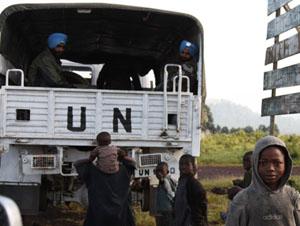‘The Responsibility to Protect’
(Image: America Abroad)
The following is not a full transcript; for full story, listen to audio.
The world has said ‘never again’ since the Holocaust, and yet it has happened again and again — from Somalia to Rwanda, the body count has been in the millions, and the number of successful interventions few. The UN Convention on Genocide has been on paper for 60 years, but never put into practice.
The international community’s impotence in the face of mass atrocities in the 90s started a global conversation that culminated in a decision by the UN — in 2005 it finally agreed that if nations can’t protect their citizens from crimes against humanity, the international community must act to save lives — it put forward the idea of the Responsibility to Protect (R2P). Like many things in the UN, the new idea looks good on paper, and just might help prevent future genocides, but as always, the challenge is to turn it into practice.
On this edition of "America Abroad," Deborah Amos investigates the application of the UN’s Responsibility to Protect (R2P) policy in Kenya following the 2008 post-election violence.
Kenya is seen as a success story for the UN and R2P, according to Ed Luck, the Special Representative to the UN Secretary General for Responsibility to Protect: "So the only time the UN has actually applied this, was in the case of Kenya, early in 2008 after the disputed elections. When there’s seven or eight hundred people … killed, it was not clear there was full-scale ethnic cleansing, but it could well become that or even something greater, and the UN decided to apply R2P criteria and to really make it the focus of the efforts there. And Kofi Anan, the former [UN] Secretary General who was doing mediation on the ground at that time, has said since that R2P was the lens through which he saw his whole efforts there."
In this report, we learn about the conditions in Kenya, and hear accounts from people in several communities there.
Amos also talks to: Maina Kiai, the former head of the Kenya National Commission on Human Rights; Eston Mokono, a Party of National Unity (PNU) supporter; Meredith Preston-McGhie, Acting Director Africa, HD Centre for Humanitarian Dialogue; George Wachira, Director of the Nairobi Peace Initiative.
This segment is one of a fourt-part program from "America Abroad." Listen to other segments and/or entire program.
Hosted by veteran public radio journalists Ray Suarez and Deborah Amos, "America Abroad" documentaries explore the critical international issues of our time.
